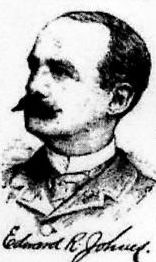|
Edward Rodolph Johnes
The National Cyclopaedia of American Biography "Johnes, Edward Rodolph, lawyer, was born at Whitesboro, Oneida Co., N.Y., Sept. 8, 1852, the son of William Pierson and Anne Louisa (Gold) Johnes. The first Johnes who emigrated to America was Edward Johnes, who came over in the fleet with Winthrop in 1622, and called the first election of selectmen in Massachusetts in 1634. He subsequently removed to Southampton, L.I., where he settled on a large tract of land that had been granted to him, and since 1644, with one exception, all the members of the family have been New Yorkers. The family mansion where Gov. Lovelace was entertained in 1660 was torn down in 1881. Four members of the Johnes family, including the subject of this sketch, were graduated from Yale College, the Rev. Timothy Johnes from whom Washington took communion just before the battle of Brandywine, having graduated in 1737. The father and grandfather of Edward R. Johnes on the paternal side were wholesale merchants in New York city. His mother was a granddaughter of Thomas Ruggles Gold, a descendant of Gov. Gold of Connecticut, and was senator and congressman from New York state in the early part of this century, his name appearing in many of the prominent law cases that were tried prior to 1827. After the death of his father, Mr. Johnes's family removed to Mobile, Ala., and subsequently to Lexington, Ky. Mr. Johnes prepared for college at Geneva, N.Y., and entered Yale in 1869, graduating four years later, and being poet of his class. After traveling abroad for a year, chiefly in Egypt and the East, Mr. Johnes returned to New York, entered the Columbia Law School, and was admitted to the bar in 1876. After a brief association with William P. Hillhouse in the practice of law, he was joined by Henry C. Wilcox, who was associated with him nearly fourteen years. . . . In 1885 he obtained the injunction which held the quotations of the Stock Exchange for his clients, the Consolidated Exchange, and under which the Exchange built up its business in stocks. In these litigations he was associated with Gen. Benjamin Tracy, and Col. R.G. Ingersoll. . . . Apart from legal matters Mr. Johnes has aided the development of many business enterprises, being the first to invest money in and to open the coal mines of central Texas and the graphite quarries of New Jersey. Mr. Johnes has devoted considerable time to literature, and has published a book of verse, entitled "Briefs by a Barrister," the "History of Southampton, L.I.," and a pamphlet, "Circumstantial Evidence of a Future State," besides other pamphlets and articles. He is one of the original 250 members of the University Club, and is also a member of St. Nicholas, Old Law, and Titans' Clubs, and of the American Geographical Society, and American Archaeological Society. He is over six feet in height, is well-proportioned, and has brown hair and eyes. He is a broad-church Episcopalian. Mr. Johnes is married, and has one child." [Source: 3 The National Cyclopaedia of American Biography 269 (New York: James T. White & Company, 1893)] Johnes died in New York City on March 28, 1903. [Source: W. Stewart Wallace, A Dictionary of North American Authors Deceased Before 1950 237 (Toronto: Ryerson Press, 1951)] Poetry Edward R. Johnes,Valedictory Poem and Oration: pronounced before the senior class in Yale College, Presentation day, June 24, 1873 (New Haven: Tuttle, Morehouse & Taylor, Printers, 1873) ________________, Briefs by a Barrister: Occasional
Verses (New York: G.P. Putnam's Sons, 1879) [online text] Writings Edward R. Johnes, The Johnes Family of Southampton, L.I., 1629-1886 (New York: W. Lowey, 1886) ______________, The Anglo-Venezuelan Controversy and The Monroe Doctrine Statement of Facts and Memorandum (New York: William Lowey, Printer, 1888) [online text] ______________, Circumstantial Evidence of Personal Immortality and a Reasonable View of Future Existence (New York: M. L. Williams, 1889) |
